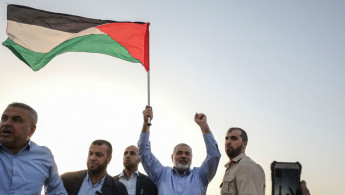Hamas chief slams 'Arab-Israeli normalisation' at Bahrain conference
Hamas leader Ismail Haniyeh said his Palestinian movement rejected next week's US-sponsored Middle East economic conference in Bahrain as it would amount to Arab "normalisation" of ties with Israel.
In a rare briefing with international journalists, Haniyeh also accused Israel of failing to abide by agreements meant to ensure calm in the Hamas-controlled Gaza Strip.
"We clearly express our rejection and non-acceptance of any Arab or Islamic country holding such a conference, which constitutes normalisation with the occupation," Haniyeh said, referring to Israel.
US President Donald Trump's administration organised the conference, which is to be held on June 25 and 26 in Manama, for the unveiling of the economic component of a US Israeli-Palestinian peace plan.
Trump's son-in-law Jared Kushner has been drafting the long-awaited plan, but it has been rejected in advance by the Palestinians, who accuse the Trump administration of pro-Israel bias.
The political part of the conference is likely to be delayed until at least after the Israeli elections in September.
Palestinians have accused the United States of trying to use the potential offer of billions of dollars in investment to avoid dealing with political issues, notably Israel's occupation of their lands.
"We reject the Manama conference and the transformation of the Palestinian cause from a political cause to an economic cause," Haniyeh said.
Haniyeh also appealed to Bahrain's King Hamad "not to hold this workshop," vowing protests "in all the Palestinian lands and beyond".
An agreement reached in November is supposed to ensure calm in exchange for Israel easing its blockade of the Gaza Strip.
Israel has never publicly confirmed the deal but has since allowed Qatar to bring millions in cash and investments into the Palestinian enclave.
In May, the two sides came close to a new conflict, with Hamas and Islamic Jihad firing hundreds of rockets from Gaza and the Israeli military striking dozens of targets in response.
Haniyeh accused Israel of not implementing the agreements reached.
"The understandings today are in the danger zone, due to the failure of the (Israeli) occupation to implement what was agreed upon."
'Form of blackmail'
Haniya pointed to the distance Israel allows Gaza fishermen to operate off the coast, saying Israel had pledged to extend it to up to 18 nautical miles.
Israel last week banned all fishing off the coast, though it has since been resumed to six miles.
"The Israeli occupation uses this range as a form of blackmail," said Haniyeh.
"We are not against a just peace (with Israel) based on just rights but we are against surrender," he added.
Israel says the restrictions are necessary to isolate Hamas, saying the group often seeks to smuggle weapons into the Gaza Strip.
Earlier on Thursday, Qatar began distributing $100 payments to 60,000 poor Palestinian families in Gaza in the latest tranche of money agreed as part of the November ceasefire.
The gas-rich Gulf state, which is a longstanding ally of Hamas, has since been providing regular payments.
Follow us on Twitter: @The_NewArab





 Follow the Middle East's top stories in English at The New Arab on Google News
Follow the Middle East's top stories in English at The New Arab on Google News
![Israeli forces ordered bombed Gaza's Jabalia, ordering residents to leave [Getty]](/sites/default/files/styles/image_330x185/public/2176418030.jpeg?h=a5f2f23a&itok=_YGZaP1z)

